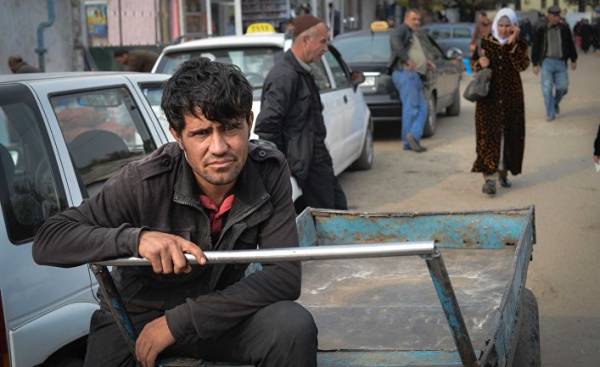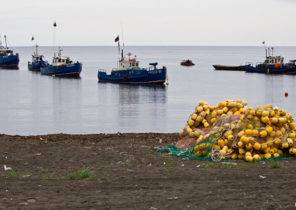
On the outskirts of the Tajik capital Dushanbe, 27-year-old Zebo managed to open a small shop. She was hoping that he would help pull her family out of poverty, but instead of a lifeline store has become a stone around her neck.
To open this outlet, in 2010, her parents, occupying low-paid positions, civil servants, decided to take a Bank loan. From the revenues generated from those barely noticeable little shop, located between two apartment buildings, depends on a family of 10 people. Also, these money have to repay their loan from the Bank.
Zebo opened the shop in the hope of improving the economic situation in the country, but her optimism was unjustified. The impact of Russia falling oil prices and imposed by the West sanctions, loud echoed in Tajikistan.
“People are in a panic. The salaries are small and prices are constantly rising. People have to save everybody, and they began to buy less meat, oils and sweets. Take only the Essentials — flour, potatoes, carrots and vegetable oil. We can’t lower prices because we also have to purchase products at high prices. We also need to make a living,” said Zebo. We don’t call her name because of security reasons.
Prices have risen very markedly. Just a month ago, a kilo of beef was worth 32 somoni (3.8 per dollar), and now — 40. Cost 50 kilogrammovogo bag of flour has increased from 320 to 370 somoni. The price of potatoes and carrots has doubled, from 2.6 and 1.2 somoni, respectively, to 5 and 2.5 somoni.
In its February report, the world food programme, the UN said that a quarter of the residents of Tajikistan, interviewed in the framework of organization studies, spend over 75% of disposable income on food.
“Apparently, the share of expenditure on food in 2016 has grown both in winter and in the spring, and in spring this percentage was higher,” the report reads.
Price hikes for food to a certain extent are seasonal and are the result of seasonal shortages of certain goods, but this time the price increase is also associated with the weakening of the national currency, the somoni. Since the beginning of the year the somoni to the dollar fell from 7.9 to 8.5.
In addition, before people could count on financial support from outside, but this flow is much weaker. In 2013, working in Russia, Tajik migrant workers sent home around $4 billion, but by 2016 this figure dropped by half to 2 billion dollars.
Despite the assurances of the National Bank of Tajikistan, people believe TJS unreliable currency and trying to save money in dollars, find that is becoming increasingly difficult.
The rise of the dollar really hurts those who, as the family of Zebo, took a Bank loan, indexed to the American currency. “We took a loan in dollars when the rate was at 4.5 somoni per dollar,’ said Zebo. But we earn in TJS. We had to extend the maturity of the debt, and eventually we will pay twice the amount than was taken in the Bank”.
“We want to sell the store and pay off debts. It’s cheaper than to wait for the next jumps of the course and to pay to the Bank. But everyone understands that doing business is now extremely difficult, and a buyer for our store. So we continue to work,” she added.
Soulfire, state official, whose name we also do not call, said EurasiaNet.org that also has grown the price of drugs.
“My mother has a bad heart and she is in constant need of medication. We used to give them 300 TJS, and now 600. So we have to economize on other drugs,” she said.
According to Soulfire, for example, the drug Roxera, which reduces the level of cholesterol in the blood and reduce the chance of heart attack, used to cost 80 rubles, and now — 110. The price of the drug Amlesa to control blood pressure also jumped from 60 to 97 TJS.
“We have to save on medications and keep track of what we eat. It’s risky, but we have no other choice, yet the times will not improve,” she added.
One reason for the shortage of dollars in the market are the ongoing difficulties with problem banks.
Occupying a leading position in the market Agroinvestbank and Tojiksodirotbank and closed now Fonebank and Tajprombank for a long time did not allow customers to withdraw money from the accounts. The ban on payments was lifted only recently, but at the same time banks began to issue money to customers TJS only in even dollar amounts. Thrown into circulation a new mass of TJS resulted in the depreciation of the national currency.
One of the side effects was the actual rejection of the cashless payment and go to cash. People prefer to keep money “under the pillow”, and increasing the number of Bank customers who are getting used to pay the card again it went into decline.
Partially the economic difficulties of Tajikistan due to external factors that Dushanbe can not affect, but largely the problems are inside the country. “The higher the level of corruption, the higher the prices, the economist noted Smidgen of Nasriddinov. — Our prices for food are comparable with the European or even higher. Sales are down, so taxes are paid from savings. In anticipation of better times, people began to spend all their savings and now are left with nothing”.
Meanwhile, the authorities have shown little concern.
President Emomali Rahmon never ceases to boast of victories in the fight against poverty. Now the government has announced plans to reduce the level of poverty in the country by 2020 to 20%, compared to 31% in 2015.
The Bank also insists that there are no problems with the irregular rate of the national currency, directly said April 7 that “no problems with the shortage of foreign currency in Tajikistan does not exist.”
“In recent days, in the market of purchase and sale of cash US dollar is influenced by psychological and speculative factors among the population a panic and anxiety situation. A significant difference emerged between the official market rate and the informal buying and selling rate of cash U.S. dollar led to the fact that some people in droves to buy dollars in credit organizations in order to obtain speculative gains,” reads the statement of the Bank.







